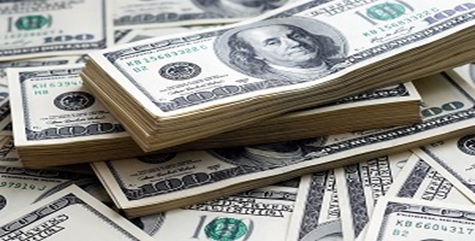
BY ABEBE WOLDEGIORGIS
The exchange rate between Birr and that of Dollar in the black market is alarmingly widening and the difference rose to 20 Birr as compared to the formal bank rate. Some argue that after the allowing of the importation of commodities through Franco Valuta, the demand of Dollar in the black market is increasing and the rate is rising.
In fact, the intention of the introduction of Franco Valuta is to stabilize the market by allowing importers to import goods free of tax. To that end, the government lost 30 billion Birr from tax which would have been spent for development endeavor.
Currently, the exchange rate in the parallel market has reached one Dollar to 72 ETB. In the formal bank system, however, one Dollar is exchanged for 52 Birr. As a result, the gap between formal market and the black market has risen to 20 Birr. According to financial economic experts, such gap is very high in which the nation had ever experienced.
Some business men resorted to obtain hard currency from the black market to import goods through Franco Valuta and the increasing demand for hard currency from parallel market ultimately widened the gap of Birr vs. Dollar exchange rate. Nevertheless, the government is trying its level best to narrow the gap between the formal and the informal market. However, though such situation is considered as one factor, the commodity price hike in the world market also brought its own impact for the decline of the value of Birr.
In this regard, Professor Almayehu Geda, an Instructor in the Department of Economics at AAU said that the widening gap in the exchange rate of Dollar vs. Birr in the black market is attributed to the price inflation of commodities in the market. Moreover, the official devaluation of Birr against the Dollar by the National Bank of Ethiopia further widened the gap.
Be it by Franco Valuta or by other factors, the continuation of the exacerbation of the gap in the exchange rate of Dollar vs. Birr poses other economic troubles. One of the problems which can be mentioned here is that the exacerbating of the widening gap might force Ethiopian Diaspora to send remittance through the parallel market channel which in turn reduces the dollar coming in the formal channel and leaves the nation to the disadvantageous position. The practice might also reduce the nation’s capacity of reserving hard currency.
Similar to the black market, in the last four years the value of Dollar is increased by 120 percent in the formal market. In the black market the value of Dollar is increased in unprecedented manner and unless it is contained, the living cost of the ordinary citizens will be precarious and brings a negative consequence in the economy. Therefore, the government should take necessary measures to narrowing the gap.
Manager of Zemen Bank, Dereje Zenebe, on his part said that the first step to handle the matter is that the government should identify the factors that aggravate shortage of hard currency in banks.
He further said that commodities that are listed to be imported by Franco Valuta such as wheat, edible oil and sugar price in the world market has been sky rocketing. Hence, importation of those commodities needs huge amount of hard currency and such situation in turn aggravates shortage of the hard currency. Therefore, it is essential to manage Franco monetary system in a cautious manner.
Obviously, importers need hard currency to run their business but obtaining Dollar from banks in the formal market might consume their time. Consequently, they might be forced to look for the black market this in turn increases the Dollar price.
According to financial experts, the widening gap of exchange rate between the local currency and that of hard currency might drain foreign currency to the black market for comparative advantage which in turn makes the banks the loser. And in the long run, banks might face shortage of budget even to run their day to day business.
As to professor Alemayehu, reducing inflation can be taken as a measure to tackle shortage of hard currency in the banks. In addition, holding the official devaluation of the value of Birr by the National Bank of Ethiopia for the time being is essential. On the other hand, to keep on the inflow of remittance in the formal channel, the government should set special price for the Dollar –Birr exchange rate so that remittance senders develop confidence to send their money through the formal channel which boosts the nation’s currency reserve.
Others who have rich experience in purchasing Dollar from the black market said that black market gives way for illegal trade, money laundering for criminal activity beyond the national territory, strengthen drug and weapon smugglers which pose violence, facilitate corruption, weaken institutions and divert the market from formal channel. Therefore, the government should consciously take remedial action.
Yared Hilemeskel is a financial economist with long experience in managing financial company in the United Kingdom. As to him, in Ethiopia, there is no shortage of currency but what makes the currency scarcity pervasive is that the government’s incorrect financial policy which inherited from the previous socialism oriented regime.
He further said that by the year 2010 EC, Ethiopia has had 23.5 billion Dollar currency reserve. It also could attract 17 billion Dollar from abroad in the form of Foreign Direct Investment in such a way it would have obtained five billion Dollars as profit but it remained unable, because the governing law that hampered exporters not to do so.
The law also makes shy away people not to show interest to deposit hard currency locally. For example, if an Ethiopian soldier serving under UN peace keeping mission in a country wants to deposit the Dollar that he obtained as a form of salary in Ethiopian Banks, he is only allowed to get back his money in the exchange of Birr based on the existing exchange rate. Therefore, in order to secure his advantage, he might be forced to open bank account in other neighboring countries to deposit the money where he could get back in Dollar.
There are also Ethiopians working in the Ethiopian Airlines who are paid their salary by Dollar but because of the above mentioned reason, they deposit their Dollar in foreign banks. Other Ethiopians residing in other countries and working for Ethiopian Airlines’ ticket offices do not bring and deposit their Dollar here because if they deposit here they will get it back in the form of Birr. As a result, they will be forced to deposit it in foreign countries.
The other law which discourages people not to deposit their Dollar in the Banks is that when exporters obtain Dollar from foreign market, the existing law stipulates them that unless they use it within 28 days, it will be exchanged in to Birr because of this, they are obliged to import other commodities.
Thus, the rule should be seen critically because it negatively impacts the accumulation of currency reserve in Ethiopia. If a sesame exporter, for instance, who obtains one million Dollar and wants to establish a factory, he is unable to withdraw the same currency when his money reaches to five million Dollars because his deposited money will be exchanged into Birr in the bank after 28 days.
Therefore, the government should introduce new laws to encourage Ethiopians deposit their currency in banks for long, the scholars suggested.
The Ethiopian Herald June 23/2022





